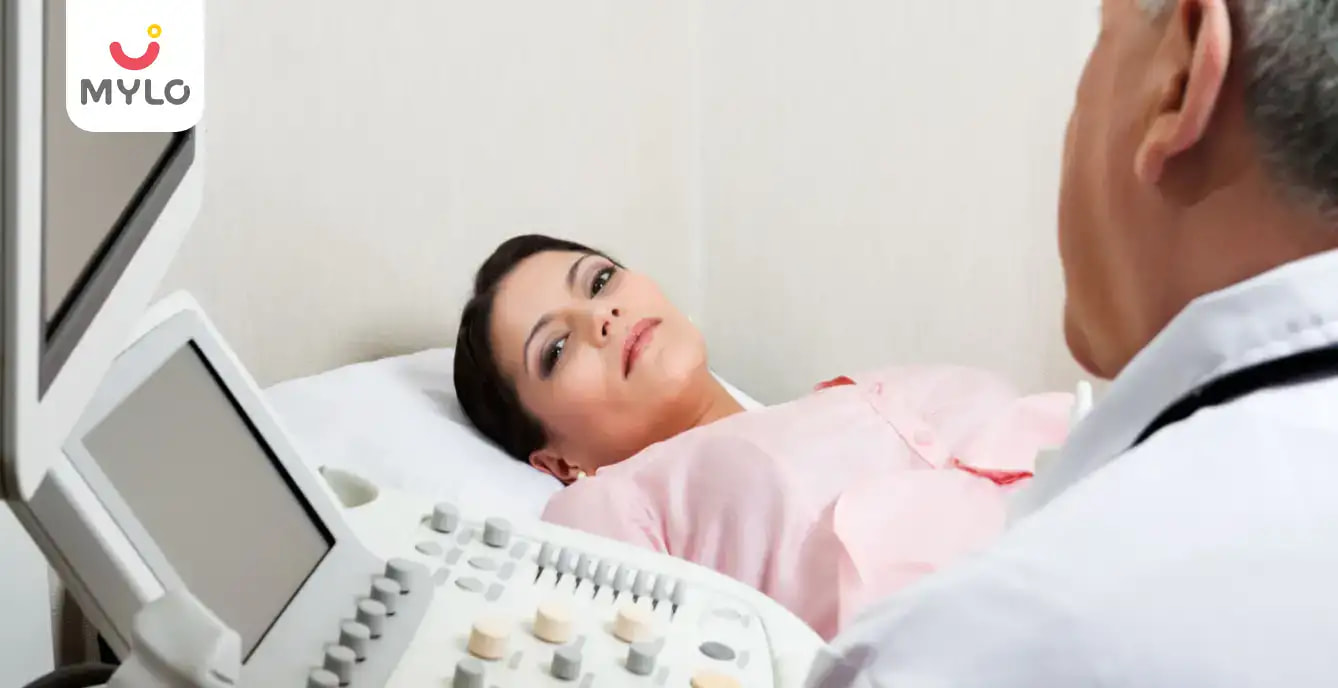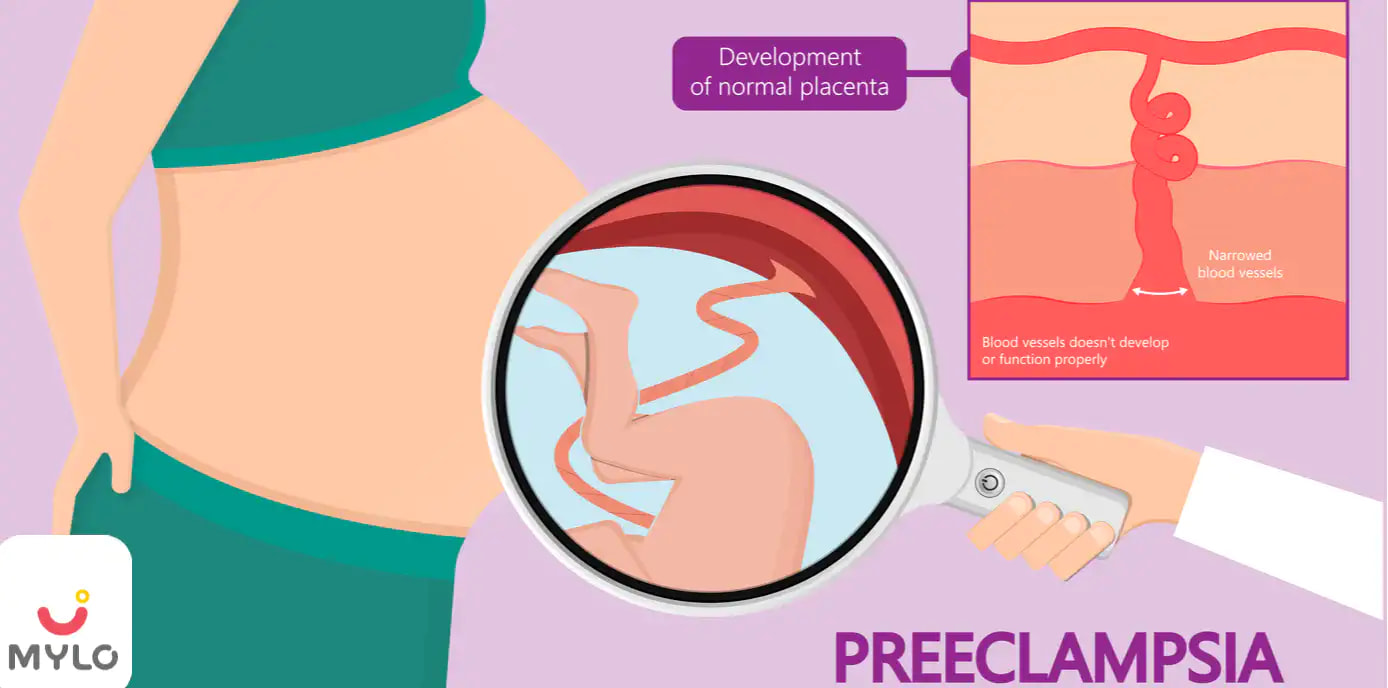Home

Pregnancy Complications

High-Risk Pregnancy -Causes, Symptoms & Management
In this Article

Pregnancy Complications
High-Risk Pregnancy -Causes, Symptoms & Management
Updated on 3 November 2023
Pregnancy is a beautiful and transformative time in a woman's life, but for some expecting mothers, certain factors can categorize their expectant time as a high-risk pregnancy. You might be wondering what are the causes of high-risk pregnancy. Explore how maternal age, pre-existing medical conditions, lifestyle choices, and previous pregnancy complications can impact the overall risk level. By understanding these causes, you can better appreciate the challenges and the need for specialized care.
In this informative guide, we will dive into the many facets of high-risk pregnancies, providing insight into the causes, recognizing the symptoms, and exploring the available treatment options. Whether you are personally navigating a high-risk pregnancy or seeking knowledge to support a loved one, this guide aims to offer a clear understanding in a language that is easily digestible.
What Is High-Risk Pregnancy?
A high-risk pregnancy refers to a pregnancy where the health of the mother, the developing fetus, or both are at an increased risk of experiencing complications compared to a typical pregnancy.
The label of high risk does not necessarily mean that complications are inevitable. Still, it signifies the need for specialized medical care and monitoring to ensure the well-being of both the mother and the baby. High-risk pregnancies require closer observation, frequent check-ups, and potential interventions to manage potential risks or complications.
How Is Common High-Risk Pregnancy?
High-risk pregnancies are relatively common and can affect many expectant mothers. The prevalence of high-risk pregnancies varies depending on factors, including maternal age, pre-existing medical conditions, and other individual risk factors.
Pre-existing medical conditions, such as diabetes, hypertension, and autoimmune disorders, also contribute to the prevalence of high-risk pregnancies. Research suggests that these conditions can increase the risk of complications during pregnancy, including preterm birth, fetal growth restriction, and the need for interventions.
You may like: What is a High Risk Pregnancy: Causes, Types, Warning Signs & Management
High-Risk Pregnancy Diagnosis
High-risk pregnancy diagnosis typically involves a combination of medical history review, physical examinations, and specialized tests or screenings. Here are some common aspects involved in the diagnosis of high-risk pregnancy:
1. Medical history assessment
The healthcare provider will inquire about the mother's medical history, including pre-existing conditions, previous pregnancies, and known risk factors. This helps identify potential concerns and determine if additional monitoring or interventions are necessary.
2. Physical examinations
The healthcare provider will conduct a thorough physical examination, including checking blood pressure, measuring weight, and assessing general health. This helps identify any immediate concerns and establish a baseline for future monitoring.
3. Specialized tests and screenings
Additional tests may be recommended based on individual risk factors or suspected complications. These include genetic screenings, ultrasound scans, blood tests, or specialized imaging studies to assess fetal well-being and identify abnormalities or potential risks.
Also read: NT Scan During Pregnancy - A Comprehensive Guide
Common Risk Factors in High-Risk Pregnancy
Various factors can influence high-risk pregnancies that increase the likelihood of complications for the mother or the developing fetus. Here are some of the common risk factors:
1. Maternal Age
Advanced maternal age, typically defined as 35 years or older, is considered a risk factor as they have a higher chance of complications such as gestational diabetes, preeclampsia, and fetal chromosomal abnormalities.
2. Pre-existing Medical Conditions
Women with pre-existing medical conditions such as diabetes, hypertension (high blood pressure), thyroid disorders, autoimmune diseases, or kidney disease may have a higher risk of complications during pregnancy.
Also read: Gestational Diabetes During Pregnancy: Symptoms, Diagnosis & Treatment
3. Previous Pregnancy Complications
Women who have previously experienced complications during pregnancy, such as preterm birth, gestational diabetes, preeclampsia, or fetal growth restrictions, are more likely to have a high-risk pregnancy in subsequent pregnancies.
4. Multiple Pregnancies
Carrying multiples, such as twins, triplets, or higher-order pregnancies, increase the risk of complications.
5. Lifestyle Factors
Confident lifestyle choices can contribute to high-risk pregnancies. These include smoking, substance abuse, excessive alcohol consumption, and inadequate prenatal care. These factors can adversely affect both the mother's and the baby's health.
6. Infections and Medical Conditions During Pregnancy
Infections such as human immunodeficiency virus (HIV) and sexually transmitted diseases increase the risk of complications during pregnancy.
7. Fetal Factors
Some high-risk pregnancies are attributed to fetal factors, such as genetic abnormalities, congenital anomalies, or fetal growth restrictions.
It's important to remember that having one or more risk factors does not guarantee complications, but it highlights the need for heightened medical attention and monitoring during pregnancy.
High-Risk Pregnancy Causes
Common High-risk pregnancy causes are listed below:
- Maternal age (35 years or older)
- Pre-existing medical conditions (diabetes, hypertension, etc.)
- Previous pregnancy complications
- Multiple pregnancies (twins, triplets, etc.)
- Lifestyle factors (smoking, substance abuse, etc.)
- Infections during pregnancy
- Fetal factors (genetic abnormalities, congenital anomalies, etc.)
High-Risk Pregnancy Symptoms
The following symptoms might be indicative of high-risk pregnancy:
- High blood pressure
- Excessive weight gain or loss
- Severe or persistent abdominal pain
- Vaginal bleeding or spotting
- Severe headaches
- Swelling in the hands, face, or legs
- Decreased fetal movement
- Preterm contractions
- Changes in vision
- Persistent vomiting or nausea
High-Risk Pregnancy Management
High-risk pregnancy management involves a comprehensive approach to ensure the well-being of both the mother and the developing fetus. It typically includes the following aspects:
1. Specialized Prenatal Care
Women with high-risk pregnancies require more frequent and technical prenatal care visits. These visits closely monitor the mother's health, fetal growth, and development. Regular check-ups allow healthcare providers to identify any potential complications early on.
2. Lifestyle Modifications
Women with high-risk pregnancies are often advised to make lifestyle changes to reduce risks. These may include quitting smoking, avoiding alcohol and illicit drugs, maintaining a healthy diet, and engaging in appropriate physical activity as the healthcare provider recommends.
3. Medication and Treatment
In some cases, medication or medical interventions may be necessary to manage specific conditions or prevent complications. This can include medications to control blood pressure, manage diabetes, or prevent preterm labour. The healthcare provider will discuss any recommended treatments or interventions in detail.
4. Fetal Monitoring
Close monitoring of fetal well-being is crucial in high-risk pregnancies. This may involve regular ultrasound scans, fetal heart rate monitoring, or other tests to assess the baby's growth, movement, and overall health.
5. Consultation with Specialists
Depending on the risks involved, women with high-risk pregnancies may be referred to maternal-fetal medicine specialists, genetic counsellors, or other healthcare professionals with expertise in managing complex pregnancies.
6. Emotional Support
High-risk pregnancies can be emotionally challenging for expectant mothers and their families. Emotional support from healthcare providers, counsellors, or support groups can be beneficial in coping with stress, anxiety, and concerns related to pregnancy.
7. Delivery Planning:
The mode and timing of delivery will be carefully considered in high-risk pregnancies. Depending on the specific circumstances, a vaginal delivery or a planned cesarean section may be recommended to ensure the safest possible delivery for both the mother and the baby.
Each high-risk pregnancy is unique, and the management approach will vary based on individual circumstances. Expectant mothers must maintain open communication with their healthcare provider, follow recommended guidelines, and actively participate in their care to optimize the chances of a healthy outcome for themselves and their babies.
High-Risk Pregnancy Prevention
A high-risk pregnancy, although fearful, is not impossible to overcome. Following a few healthy methods may help with its prevention.
1. Weight Control Before Pregnancy
Being obese during pregnancy increases risk factors, so achieving a target weight is advisable.
2. Managing Pre-Existing Medical Conditions
Careful monitoring and controlling health conditions like high blood pressure and diabetes can be handy in reducing pregnancy complications.
3. Prenatal Supplements
Pregnancy can be very demanding on the body, and prenatal supplements rich in vitamins, folic acid, proteins, and iron can be beneficial.
4. Avoiding Alcohol or Tobacco
These are health hazards for a healthy person and should be avoided before, during, and after pregnancy.
5. Knowledge about Older Maternal Age
Women who get pregnant post-aged 35 should be well-versed in the related risks.
6. Being in Regular Touch with the Doctor
Regular prenatal appointments can be beneficial in knowing the health of the mother and the child.
In conclusion, high-risk pregnancies are a challenging journey that requires careful management and specialized care. The well-being of both the mother and the baby is of utmost importance, and it is crucial to have a multidisciplinary team of healthcare professionals working together to ensure the best possible outcomes. From advanced prenatal screenings and diagnostic tests to close monitoring and tailored treatment plans, modern medicine offers a range of options to mitigate the risks associated with high-risk pregnancies. While high-risk pregnancies present unique challenges, with proper care and attention, many women successfully overcome these obstacles and welcome healthy babies into their lives. Remember, every pregnancy is different, and seeking early and comprehensive medical guidance is key to promoting a safe and positive pregnancy experience.
References
Holness, N. (2018). High-Risk Pregnancy. Nursing Clinics of North America, 53(2), 241–251.
Rajbanshi, S., Norhayati, M. N., & Nik Hazlina, N. H. (2020). High-risk pregnancies and their association with severe maternal morbidity in Nepal: A prospective cohort study. PLOS ONE, 15(12), e0244072.



Written by
Priyanka Verma
Priyanka is an experienced editor & content writer with great attention to detail. Mother to an 11-year-old, she's a ski
Read MoreGet baby's diet chart, and growth tips

Related Articles
Related Questions
Hello frnds..still no pain...doctor said head fix nhi hua hai..bt vagina me pain hai aur back pain bhi... anyone having same issues??

Kon kon c chije aisi hai jo pregnancy mei gas acidity jalan karti hain... Koi btayega plz bcz mujhe aksar khane ke baad hi samagh aata hai ki is chij se gas acidity jalan ho gyi hai. Please share your knowledge

I am 13 week pregnancy. Anyone having Storione-xt tablet. It better to have morning or night ???

Hlo to be moms....i hv a query...in my 9.5 wk i feel body joint pain like in ankle, knee, wrist, shoulder, toes....pain intensity is high...i cnt sleep....what should i do pls help....cn i cosult my doc.

Influenza and boostrix injection kisiko laga hai kya 8 month pregnancy me and q lagta hai ye plz reply me

Related Topics
RECENTLY PUBLISHED ARTICLES
our most recent articles

Diet & Nutrition
গর্ভাবস্থায় আলুবোখরা: উপকারিতা ও ঝুঁকি | Prunes During Pregnancy: Benefits & Risks in Bengali

Diet & Nutrition
গর্ভাবস্থায় হিং | ঝুঁকি, সুবিধা এবং অন্যান্য চিকিৎসা | Hing During Pregnancy | Risks, Benefits & Other Treatments in Bengali

Women Specific Issues
স্তনের উপর সাদা দাগ: লক্ষণ, কারণ এবং চিকিৎসা | White Spots on Nipple: Causes, Symptoms, and Treatments in Bengali

Diet & Nutrition
গর্ভাবস্থায় পোহা: উপকারিতা, ধরণ এবং রেসিপি | Poha During Pregnancy: Benefits, Types & Recipes in Bengali

Diet & Nutrition
গর্ভাবস্থায় মাছ: উপকারিতা এবং ঝুঁকি | Fish In Pregnancy: Benefits and Risks in Bengali

Diet & Nutrition
গর্ভাবস্থায় রেড ওয়াইন: পার্শ্ব প্রতিক্রিয়া এবং নির্দেশিকা | Red Wine During Pregnancy: Side Effects & Guidelines in Bengali
- ইনার থাই চ্যাফিং: কারণ, উপসর্গ এবং চিকিৎসা | Inner Thigh Chafing: Causes, Symptoms & Treatment in Bengali
- গর্ভাবস্থায় ব্রাউন রাইস: উপকারিতা ও সতর্কতা | Brown Rice During Pregnancy: Benefits & Precautions in Bengali
- Velamentous Cord Insertion - Precautions, Results & Safety
- Unlock the Secret to Flawless Skin: 7 Must-Have Qualities in a Face Serum
- Unlock the Secret to Radiant Skin: How Vitamin C Serum Can Transform Your Complexion
- Gender No Bar: 10 Reasons Why Everyone Needs a Body Lotion
- Unlock the Secret to Radiant Skin How to Choose the Perfect Body Lotion for Your Skin Type
- Top 10 Reasons to Apply a Body Lotion After Every Bath
- Communication in Toddlers: Milestones & Activities
- How to Improve Vocabulary for Toddlers?
- A Comprehensive Guide to Understanding Placenta Accreta
- Vulvovaginitis in Toddlers Causes, Symptoms and Treatment
- A Comprehensive Guide to Understanding Cerebral Palsy in Children
- Bitter Taste in Mouth During Pregnancy: Understanding the Causes and Remedies


AWARDS AND RECOGNITION

Mylo wins Forbes D2C Disruptor award

Mylo wins The Economic Times Promising Brands 2022
AS SEEN IN

- Mylo Care: Effective and science-backed personal care and wellness solutions for a joyful you.
- Mylo Baby: Science-backed, gentle and effective personal care & hygiene range for your little one.
- Mylo Community: Trusted and empathetic community of 10mn+ parents and experts.
Product Categories
baby carrier | baby soap | baby wipes | stretch marks cream | baby cream | baby shampoo | baby massage oil | baby hair oil | stretch marks oil | baby body wash | baby powder | baby lotion | diaper rash cream | newborn diapers | teether | baby kajal | baby diapers | cloth diapers |








